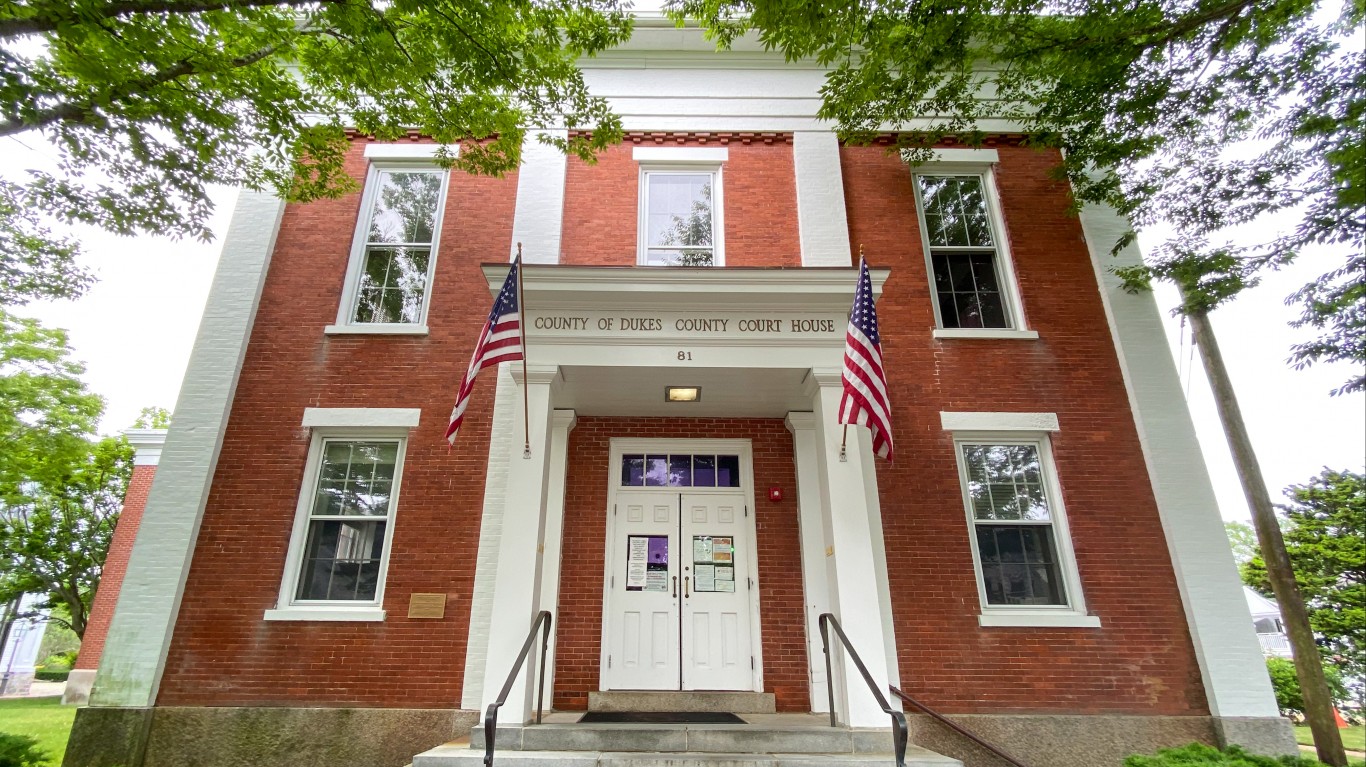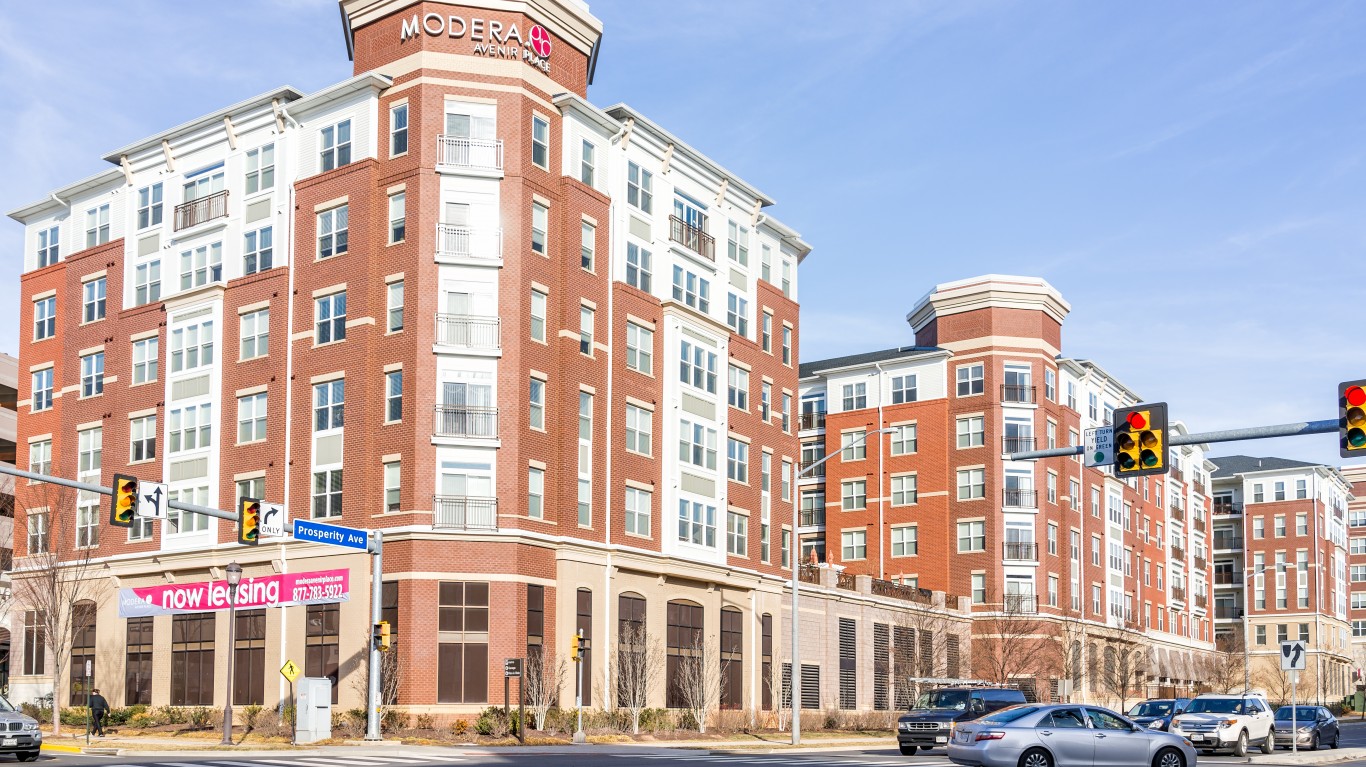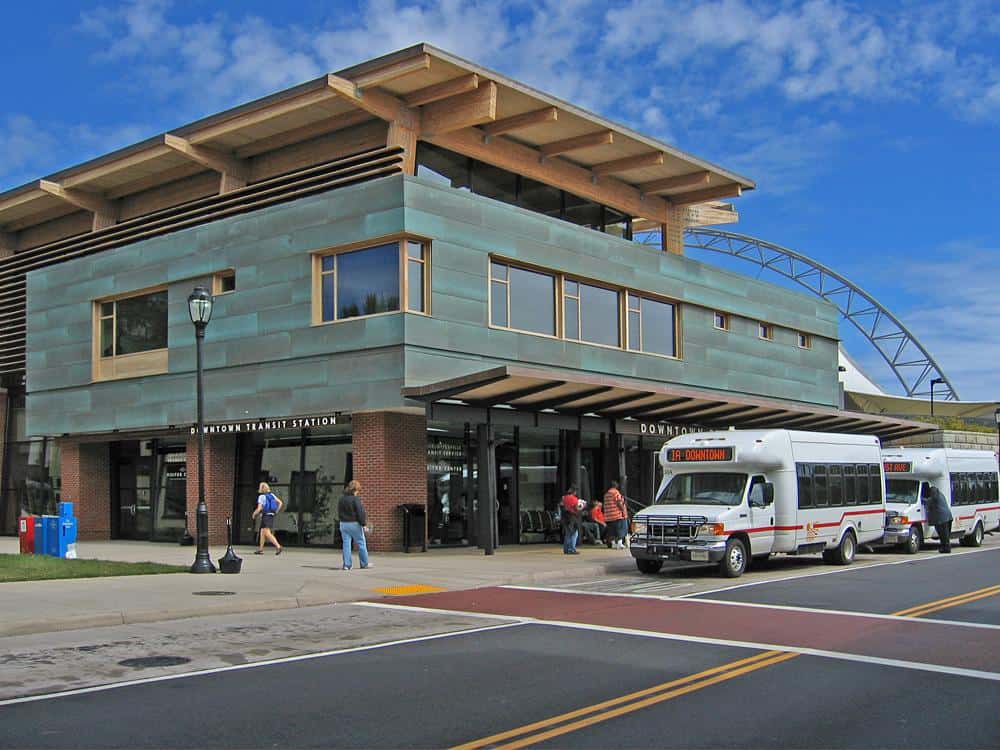
24/7 Wall St. Insights
- Trump has been vocal about ending tax credits for EVs.
- A majority of Americans want EVs rebates, with the strongest support in Democratic counties in the Northeast.
- Suffolk County, NY, stands out as the most Republican county among the top 50.
- Also: 2 Dividend Legends to Hold Forever
Twice a year, the Yale Program on Climate Change Communication conducts the most comprehensive survey on climate change knowledge and opinion in the United States. Out of 30 questions, one of the most contentious is about whether participants support providing tax rebates for people who purchase energy-efficient vehicles or solar panels.
In their survey, Yale asked participants, “How much do you support or oppose providing tax rebates for people who purchase energy-efficient vehicles or solar panels?”. While nationwide 73.7% of Americans support providing tax rebates for energy-efficient vehicles or solar panels, large regional disparities persist throughout the country.
In New York County, 82.3% of residents support providing tax rebates for energy-efficient vehicles or solar panels, the most of any county nationwide. Meanwhile, in Jack County in northeast Texas, just 57.5% of residents support providing tax rebates for energy-efficient vehicles or solar panels, the least of any county. On average, 76.9% of residents in the Northeast support providing tax rebates for energy-efficient vehicles or solar panels, compared to 74.8% of residents in the West, 73.0% in the Midwest, and 71.7% in the South.
To determine the counties that support providing tax rebates for energy-efficient vehicles or solar panels the most, 24/7 Wall St. reviewed data on climate change belief from the Yale Program on Climate Change Communication. Counties were ranked based on the percentage of surveyed residents who answered that they “somewhat” or “strongly support” providing tax rebates for energy-efficient vehicles or solar panels in 2023. Supplemental data on median household income and the percentage of adults with at least a bachelor’s degree is from the U.S. Census Bureau’s American Community Survey and is for 2022. Data on natural hazard risk rating is from FEMA.
50. New York County, NY

- Residents who support providing tax rebates for energy-efficient vehicles or solar panels: 82.3%
- Residents who believe that global warming is happening: 84.8%
- Adults with a bachelor’s degree or higher: 62.8%
- Median household income: $99,880
- FEMA disaster risk level: Relatively High
- County seat: Manhattan
49. Alexandria City, VA

- Residents who support providing tax rebates for energy-efficient vehicles or solar panels: 81.0%
- Residents who believe that global warming is happening: 85.6%
- Adults with a bachelor’s degree or higher: 66.0%
- Median household income: $113,179
- FEMA disaster risk level: Relatively Low
- County seat: Alexandria
48. Suffolk County, MA

- Residents who support providing tax rebates for energy-efficient vehicles or solar panels: 81.0%
- Residents who believe that global warming is happening: 82.3%
- Adults with a bachelor’s degree or higher: 49.2%
- Median household income: $87,669
- FEMA disaster risk level: Relatively Moderate
- County seat: Boston
47. Alameda County, CA

- Residents who support providing tax rebates for energy-efficient vehicles or solar panels: 81.0%
- Residents who believe that global warming is happening: 86.1%
- Adults with a bachelor’s degree or higher: 50.9%
- Median household income: $122,488
- FEMA disaster risk level: Very High
- County seat: Oakland
46. Montgomery County, MD

- Residents who support providing tax rebates for energy-efficient vehicles or solar panels: 80.9%
- Residents who believe that global warming is happening: 84.2%
- Adults with a bachelor’s degree or higher: 60.0%
- Median household income: $125,583
- FEMA disaster risk level: Relatively Moderate
- County seat: Rockville
45. District of Columbia, DC

- Residents who support providing tax rebates for energy-efficient vehicles or solar panels: 80.8%
- Residents who believe that global warming is happening: 86.7%
- Adults with a bachelor’s degree or higher: 62.6%
- Median household income: $101,722
- FEMA disaster risk level: Relatively Moderate
- County seat: Washington
44. Hampshire County, MA

- Residents who support providing tax rebates for energy-efficient vehicles or solar panels: 80.4%
- Residents who believe that global warming is happening: 81.1%
- Adults with a bachelor’s degree or higher: 50.4%
- Median household income: $84,025
- FEMA disaster risk level: Relatively Low
- County seat: Northampton
43. San Mateo County, CA

- Residents who support providing tax rebates for energy-efficient vehicles or solar panels: 80.3%
- Residents who believe that global warming is happening: 84.8%
- Adults with a bachelor’s degree or higher: 52.9%
- Median household income: $149,907
- FEMA disaster risk level: Relatively High
- County seat: Redwood City
42. San Francisco County, CA

- Residents who support providing tax rebates for energy-efficient vehicles or solar panels: 80.2%
- Residents who believe that global warming is happening: 87.1%
- Adults with a bachelor’s degree or higher: 59.8%
- Median household income: $136,689
- FEMA disaster risk level: Relatively High
- County seat: San Francisco City and County
41. Camden County, NJ

- Residents who support providing tax rebates for energy-efficient vehicles or solar panels: 80.2%
- Residents who believe that global warming is happening: 79.1%
- Adults with a bachelor’s degree or higher: 34.3%
- Median household income: $82,005
- FEMA disaster risk level: Relatively Moderate
- County seat: Camden
40. Philadelphia County, PA

- Residents who support providing tax rebates for energy-efficient vehicles or solar panels: 80.1%
- Residents who believe that global warming is happening: 80.3%
- Adults with a bachelor’s degree or higher: 33.6%
- Median household income: $57,537
- FEMA disaster risk level: Relatively High
- County seat: Philadelphia
39. Baltimore City, MD

- Residents who support providing tax rebates for energy-efficient vehicles or solar panels: 80.1%
- Residents who believe that global warming is happening: 81.7%
- Adults with a bachelor’s degree or higher: 34.9%
- Median household income: $58,349
- FEMA disaster risk level: Relatively Moderate
- County seat: Baltimore
38. Burlington County, NJ

- Residents who support providing tax rebates for energy-efficient vehicles or solar panels: 80.1%
- Residents who believe that global warming is happening: 78.2%
- Adults with a bachelor’s degree or higher: 41.1%
- Median household income: $102,615
- FEMA disaster risk level: Relatively Moderate
- County seat: Mount Holly
37. Cook County, IL

- Residents who support providing tax rebates for energy-efficient vehicles or solar panels: 79.9%
- Residents who believe that global warming is happening: 79.9%
- Adults with a bachelor’s degree or higher: 41.3%
- Median household income: $78,304
- FEMA disaster risk level: Very High
- County seat: Chicago
36. Middlesex County, MA

- Residents who support providing tax rebates for energy-efficient vehicles or solar panels: 79.9%
- Residents who believe that global warming is happening: 79.6%
- Adults with a bachelor’s degree or higher: 58.5%
- Median household income: $121,304
- FEMA disaster risk level: Relatively High
- County seat: Lowell
35. Washtenaw County, MI

- Residents who support providing tax rebates for energy-efficient vehicles or solar panels: 79.8%
- Residents who believe that global warming is happening: 82.8%
- Adults with a bachelor’s degree or higher: 57.4%
- Median household income: $84,245
- FEMA disaster risk level: Relatively Moderate
- County seat: Ann Arbor
34. Arlington County, VA

- Residents who support providing tax rebates for energy-efficient vehicles or solar panels: 79.7%
- Residents who believe that global warming is happening: 83.9%
- Adults with a bachelor’s degree or higher: 76.8%
- Median household income: $137,387
- FEMA disaster risk level: Relatively Low
- County seat: Arlington
33. Baltimore County, MD

- Residents who support providing tax rebates for energy-efficient vehicles or solar panels: 79.7%
- Residents who believe that global warming is happening: 79.8%
- Adults with a bachelor’s degree or higher: 41.2%
- Median household income: $88,157
- FEMA disaster risk level: Relatively Moderate
- County seat: Towson
32. Norfolk County, MA

- Residents who support providing tax rebates for energy-efficient vehicles or solar panels: 79.6%
- Residents who believe that global warming is happening: 80.2%
- Adults with a bachelor’s degree or higher: 56.3%
- Median household income: $120,621
- FEMA disaster risk level: Relatively Moderate
- County seat: Dedham
31. Durham County, NC

- Residents who support providing tax rebates for energy-efficient vehicles or solar panels: 79.6%
- Residents who believe that global warming is happening: 81.4%
- Adults with a bachelor’s degree or higher: 51.9%
- Median household income: $74,927
- FEMA disaster risk level: Relatively Moderate
- County seat: Durham
30. Cumberland County, ME

- Residents who support providing tax rebates for energy-efficient vehicles or solar panels: 79.5%
- Residents who believe that global warming is happening: 76.9%
- Adults with a bachelor’s degree or higher: 50.6%
- Median household income: $87,710
- FEMA disaster risk level: Relatively Moderate
- County seat: Portland
29. Dukes County, MA

- Residents who support providing tax rebates for energy-efficient vehicles or solar panels: 79.5%
- Residents who believe that global warming is happening: 79.3%
- Adults with a bachelor’s degree or higher: 43.2%
- Median household income: $93,225
- FEMA disaster risk level: Very Low
- County seat: Edgartown
28. King County, WA

- Residents who support providing tax rebates for energy-efficient vehicles or solar panels: 79.4%
- Residents who believe that global warming is happening: 83.9%
- Adults with a bachelor’s degree or higher: 54.8%
- Median household income: $116,340
- FEMA disaster risk level: Very High
- County seat: Seattle
27. Nantucket County, MA

- Residents who support providing tax rebates for energy-efficient vehicles or solar panels: 79.4%
- Residents who believe that global warming is happening: 78.8%
- Adults with a bachelor’s degree or higher: 57.4%
- Median household income: $135,590
- FEMA disaster risk level: Relatively Moderate
- County seat: Nantucket
26. Santa Clara County, CA

- Residents who support providing tax rebates for energy-efficient vehicles or solar panels: 79.3%
- Residents who believe that global warming is happening: 83.4%
- Adults with a bachelor’s degree or higher: 55.3%
- Median household income: $153,792
- FEMA disaster risk level: Very High
- County seat: San Jose
25. Queens County, NY

- Residents who support providing tax rebates for energy-efficient vehicles or solar panels: 79.3%
- Residents who believe that global warming is happening: 82.4%
- Adults with a bachelor’s degree or higher: 34.8%
- Median household income: $82,431
- FEMA disaster risk level: Relatively High
- County seat: Queens
24. Richmond City, VA

- Residents who support providing tax rebates for energy-efficient vehicles or solar panels: 79.3%
- Residents who believe that global warming is happening: 83.1%
- Adults with a bachelor’s degree or higher: 44.1%
- Median household income: $59,606
- FEMA disaster risk level: Relatively Low
- County seat: Richmond
23. Albany County, NY

- Residents who support providing tax rebates for energy-efficient vehicles or solar panels: 79.2%
- Residents who believe that global warming is happening: 78.6%
- Adults with a bachelor’s degree or higher: 44.4%
- Median household income: $78,829
- FEMA disaster risk level: Relatively Low
- County seat: Albany
22. Sonoma County, CA

- Residents who support providing tax rebates for energy-efficient vehicles or solar panels: 79.2%
- Residents who believe that global warming is happening: 78.9%
- Adults with a bachelor’s degree or higher: 37.8%
- Median household income: $99,266
- FEMA disaster risk level: Relatively High
- County seat: Santa Rosa
21. St. Louis City, MO

- Residents who support providing tax rebates for energy-efficient vehicles or solar panels: 79.1%
- Residents who believe that global warming is happening: 79.9%
- Adults with a bachelor’s degree or higher: 38.6%
- Median household income: $52,941
- FEMA disaster risk level: Relatively Moderate
- County seat: St. Louis
20. Multnomah County, OR

- Residents who support providing tax rebates for energy-efficient vehicles or solar panels: 79.1%
- Residents who believe that global warming is happening: 83.0%
- Adults with a bachelor’s degree or higher: 47.7%
- Median household income: $83,668
- FEMA disaster risk level: Relatively High
- County seat: Portland
19. Plymouth County, MA

- Residents who support providing tax rebates for energy-efficient vehicles or solar panels: 79.0%
- Residents who believe that global warming is happening: 76.8%
- Adults with a bachelor’s degree or higher: 40.5%
- Median household income: $105,387
- FEMA disaster risk level: Relatively Moderate
- County seat: Brockton
18. New Castle County, DE

- Residents who support providing tax rebates for energy-efficient vehicles or solar panels: 78.9%
- Residents who believe that global warming is happening: 74.2%
- Adults with a bachelor’s degree or higher: 38.3%
- Median household income: $85,309
- FEMA disaster risk level: Relatively Moderate
- County seat: Wilmington
17. Howard County, MD

- Residents who support providing tax rebates for energy-efficient vehicles or solar panels: 78.9%
- Residents who believe that global warming is happening: 77.2%
- Adults with a bachelor’s degree or higher: 64.0%
- Median household income: $140,971
- FEMA disaster risk level: Relatively Low
- County seat: Ellicott City
16. Sagadahoc County, ME
- Residents who support providing tax rebates for energy-efficient vehicles or solar panels: 78.9%
- Residents who believe that global warming is happening: 76.6%
- Adults with a bachelor’s degree or higher: 38.7%
- Median household income: $77,591
- FEMA disaster risk level: Very Low
- County seat: Bath
15. Suffolk County, NY

- Residents who support providing tax rebates for energy-efficient vehicles or solar panels: 78.9%
- Residents who believe that global warming is happening: 77.0%
- Adults with a bachelor’s degree or higher: 39.0%
- Median household income: $122,498
- FEMA disaster risk level: Relatively High
- County seat: Riverhead
14. Somerset County, NJ

- Residents who support providing tax rebates for energy-efficient vehicles or solar panels: 78.9%
- Residents who believe that global warming is happening: 81.0%
- Adults with a bachelor’s degree or higher: 57.3%
- Median household income: $131,948
- FEMA disaster risk level: Relatively Moderate
- County seat: Somerville
13. Tompkins County, NY

- Residents who support providing tax rebates for energy-efficient vehicles or solar panels: 78.9%
- Residents who believe that global warming is happening: 81.6%
- Adults with a bachelor’s degree or higher: 57.5%
- Median household income: $69,995
- FEMA disaster risk level: Very Low
- County seat: Ithaca
12. Falls Church City, VA

- Residents who support providing tax rebates for energy-efficient vehicles or solar panels: 78.9%
- Residents who believe that global warming is happening: 81.3%
- Adults with a bachelor’s degree or higher: 78.9%
- Median household income: $164,536
- FEMA disaster risk level: Very Low
- County seat: Falls Church
11. Chester County, PA

- Residents who support providing tax rebates for energy-efficient vehicles or solar panels: 78.9%
- Residents who believe that global warming is happening: 79.0%
- Adults with a bachelor’s degree or higher: 56.1%
- Median household income: $118,574
- FEMA disaster risk level: Relatively Moderate
- County seat: West Chester
10. Western Connecticut Planning Region, CT

- Residents who support providing tax rebates for energy-efficient vehicles or solar panels: 78.8%
- Residents who believe that global warming is happening: 81.6%
- Adults with a bachelor’s degree or higher: 54.2%
- Median household income: $118,930
- FEMA disaster risk level: N/A
- County seat: N/A
9. Fulton County, GA
- Residents who support providing tax rebates for energy-efficient vehicles or solar panels: 78.8%
- Residents who believe that global warming is happening: 80.5%
- Adults with a bachelor’s degree or higher: 57.1%
- Median household income: $86,267
- FEMA disaster risk level: Relatively Moderate
- County seat: Atlanta
8. Petersburg City, VA
- Residents who support providing tax rebates for energy-efficient vehicles or solar panels: 78.8%
- Residents who believe that global warming is happening: 80.3%
- Adults with a bachelor’s degree or higher: 21.8%
- Median household income: $46,930
- FEMA disaster risk level: Very Low
- County seat: Petersburg
7. Charlottesville City, VA
- Residents who support providing tax rebates for energy-efficient vehicles or solar panels: 78.7%
- Residents who believe that global warming is happening: 81.2%
- Adults with a bachelor’s degree or higher: 58.9%
- Median household income: $67,177
- FEMA disaster risk level: Very Low
- County seat: Charlottesville
6. Orleans Parish, LA

- Residents who support providing tax rebates for energy-efficient vehicles or solar panels: 78.7%
- Residents who believe that global warming is happening: 82.8%
- Adults with a bachelor’s degree or higher: 40.7%
- Median household income: $51,116
- FEMA disaster risk level: Relatively High
- County seat: New Orleans
5. Allegheny County, PA
- Residents who support providing tax rebates for energy-efficient vehicles or solar panels: 78.7%
- Residents who believe that global warming is happening: 76.9%
- Adults with a bachelor’s degree or higher: 43.8%
- Median household income: $72,537
- FEMA disaster risk level: Relatively Low
- County seat: Pittsburgh
4. Bergen County, NJ

- Residents who support providing tax rebates for energy-efficient vehicles or solar panels: 78.6%
- Residents who believe that global warming is happening: 83.0%
- Adults with a bachelor’s degree or higher: 51.7%
- Median household income: $118,714
- FEMA disaster risk level: Relatively High
- County seat: Hackensack
3. Barnstable County, MA

- Residents who support providing tax rebates for energy-efficient vehicles or solar panels: 78.6%
- Residents who believe that global warming is happening: 76.0%
- Adults with a bachelor’s degree or higher: 46.1%
- Median household income: $90,447
- FEMA disaster risk level: Relatively Moderate
- County seat: Barnstable
2. Johnson County, IA

- Residents who support providing tax rebates for energy-efficient vehicles or solar panels: 78.6%
- Residents who believe that global warming is happening: 79.3%
- Adults with a bachelor’s degree or higher: 54.1%
- Median household income: $72,977
- FEMA disaster risk level: Relatively Moderate
- County seat: Iowa City
1. Albemarle County, VA

- Residents who support providing tax rebates for energy-efficient vehicles or solar panels: 78.6%
- Residents who believe that global warming is happening: 79.1%
- Adults with a bachelor’s degree or higher: 60.1%
- Median household income: $97,708
- FEMA disaster risk level: Relatively Low
- County seat: Charlottesville
Are You Ahead, or Behind on Retirement? (sponsor)
If you’re one of the over 4 Million Americans set to retire this year, you may want to pay attention.
Finding a financial advisor who puts your interest first can be the difference between a rich retirement and barely getting by, and today it’s easier than ever. SmartAsset’s free tool matches you with up to three fiduciary financial advisors that serve your area in minutes. Each advisor has been carefully vetted, and must act in your best interests. Start your search now.
Don’t waste another minute; get started right here and help your retirement dreams become a retirement reality.
Thank you for reading! Have some feedback for us?
Contact the 24/7 Wall St. editorial team.








